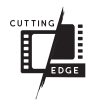Who we are
Project Cutting Edge began as a student pitch project at the Entertainment Technology Center at Carnegie Mellon University due to the desire of five graduate students to explore the usage of cuts and transitions in the VR space. As individuals who were interested in the intersection of traditional media like cinema and relatively new canvases like VR, we pitched Project Cutting Edge as a way to explore how cuts and transitions that we had found in games and movies could not only be translated into a 3D space, but also how we could map the use of these cuts and transitions in VR to a manner of storytelling that was reminiscent of cinema. Upon approval at the end of Fall Semester 2018, we started the work in earnest at the beginning of the Spring Semester.
Initially, we looked at experiences and films that dealt exclusively with editing, the most useful of which being the game Virginia (2016) and the filmography of the late Japanese animator, Satoshi Kon. From these works, we compiled a list of transitions and cuts that we either felt could work well within VR or felt that their application in the VR space could be relatively noteworthy. Out of all these transitions, we eventually settled on four to create prototypes from (which we’ve termed “Goldspikes”) in order to test the efficacy of these cuts and transitions in VR. We spent the first half of the semester tweaking and iterating on these prototypes, which you can see for yourself in our development blog.
The second half of the semester has been spent putting these same “Goldspikes” in conjunction with one another using a simple narrative that we’ve generated from our existing prototypes. By introducing a narrative, we hope to not only provide a degree of context that will allow our cuts and transitions to make sense, but also to foreground the emotional affect that these cuts and transitions are able to produce.
By the end of the semester, we are hoping to not only have a complete 3-5 minute animated, interactive experience for VR that explicitly demonstrates the use and value of the cuts and transitions that we’ve been working on, but also to produce a package containing the development tools we’ve created on Github to make these cuts and a series of YouTube videos that document our design process for these cuts and transitions. We hope that our final experience, in conjunction with the development tools we are planning to publish, will inspire and innervate future teams to continue to build upon what we’ve made this semester.

